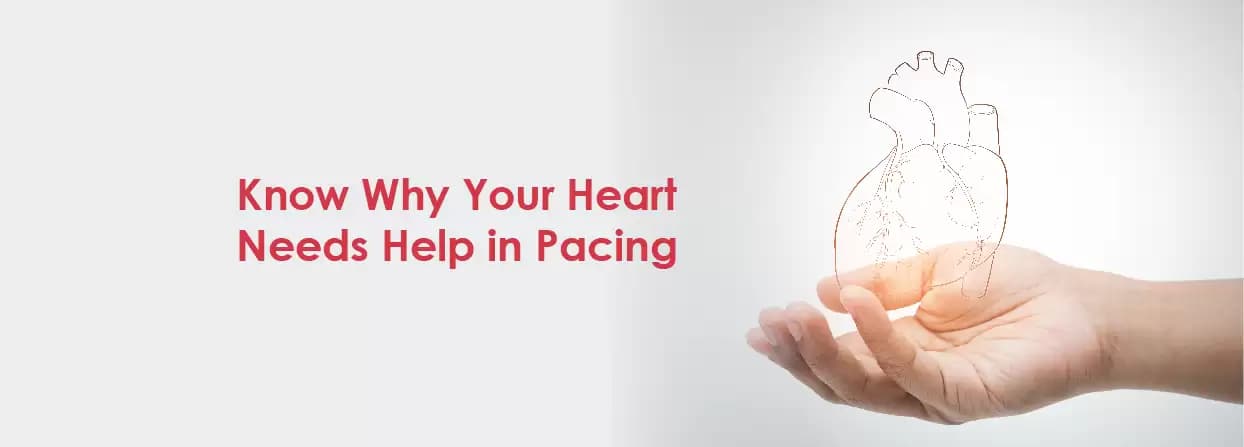
We all know that the heart beats 24/7, to pump blood to various different parts of the body and follows a stable rhythm while doing so. In some cases, however, a person may require pacing to ensure that the heart is beating healthily.
We all know that the heart beats 24/7, to pump blood to various different parts of the body and follows a stable rhythm while doing so. In some cases, however, a person may require pacing to ensure that the heart is beating healthily. You must be wondering why this happens. Well, sometimes, a person's heartbeat is too slow to meet the oxygen requirements of different body parts and hence requires a little assistance to pace up the heart rhythm. This is commonly referred to as bradycardia and is one of the leading indications for cardiac pacing. It is usually classified into two different types:
Sinus node dysfunction, in which the electrical signals from the sinus atrial slow down or disappear thereby resulting in the generation of fewer heartbeats AV block, in which the heartbeats cannot travel from the atria to the ventricles. The severity of the condition varies from one person to another.
The device that is used for addressing these problems is commonly referred to as a pacemaker. The treatment is offered at all the leading heart hospitals in Kolkata.
A pacemaker is a very small battery-operated device that is placed inside your chest by performing surgery, with the aim of monitoring and controlling your heart rhythm, you ensure that every part of your body is receiving healthy blood flow. Before we talk about the working of a pacemaker it is important to understand how a heart actually works.
The functioning of our heart solely depends upon the electrical signals that are sent by the brain to the heart and the various structures associated with it. Experts from the best pacemaker surgery hospital in Kolkata suggest that a normal and healthy heart beats around 100,000 times in a day with a rhythm of 90 to 110 beats per minute. Conditions like arrhythmia, heart block and heart failure can disturb the normal heart rhythm making it difficult for the heart to provide sufficient oxygenated blood to the muscles and brain. This is where a pacemaker comes in handy. The tiny device has a monitoring system that helps to keep a track of your heart at all times and whenever your heart rhythm is below the normal range, the pacemaker will generate electrical signals and send them to the heart via the electrodes to help it jump back into the normal pace.
A conventional pacemaker consists of 2 different parts - a pulse generator and electrodes. The former consists of the battery and other parts that are important for generating electrical signals, whereas the latter refers to insulated leads.
A pacemaker is broadly classified into three different types and the one that will suit you the best is decided after a proper evaluation of your symptoms and condition. The best heart doctors in Kolkata will curate a personalized treatment plan for you, ensuring you get the pacemaker that yields the best results for you. This may include:
Single chamber pacemaker - It consists of only one lead that connects the pulse generator to one chamber of the heart. In the majority of cases, it is the right ventricle or the lower right chamber of the heart that is connected. In case your doctors may feel the need, the lead may be connected to the upper right chamber of the heart also known as the right atrium.
Dual-chamber pacemaker - As the name suggests, it consists of two different leaves which are connected to the chambers of the heart on the right side, i.e. the right ventricle and the right atrium. Such kind of pacemaker is used to regulate the pacing of both chambers while ensuring perfect synchronization.
Biventricular pacemaker - It is popularly known as cardiac resynchronization therapy or CRT. This involves the use of 3 leads which are connected to the right atrium and both ventricles. The procedure is specially reserved for patients experiencing cardiac arrhythmia as a result of heart failure. This helps to coordinate The functioning of both ventricles in synchronization with the right atrium, thereby ensuring that blood is flowing throughout the body more efficiently.
If you want to know more about cardiac pacing, you can consult an expert from the best hospital in Kolkata today.
Written and Verified by:

Dr. Shuvo Dutta is a Senior Consultant in Cardiology Dep. at BM Birla Heart Hospital, Kolkata, with over 34 years of experience. He specializes in radial and femoral angioplasty, complex cardiac interventions, and was the first in India to perform carotid artery stenting to prevent brain stroke.
Similar Cardiology Blogs
Book Your Appointment TODAY
© 2024 BMB Kolkata. All Rights Reserved.